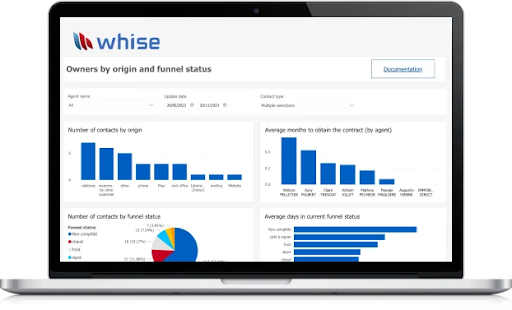In today’s data-driven and dynamic business environment, companies deal with various challenges that can slow their growth, affect decision-making, and decrease profitability. However, data analytics offers powerful solutions to these pain points, enabling businesses to extract valuable insights from their data and drive success.
10 key pain points that data analytics can solve for your business
Take a look at the following 10 key pain points that data analytics can solve for your business:
- Lack of Data-Driven Insights: Many businesses struggle with making informed decisions due to a lack of actionable insights. Data analytics addresses this pain point by providing companies with the tools and techniques to analyze vast amounts of data and uncover valuable insights. By leveraging data analytics, businesses can make data-driven decisions that are based on evidence rather than intuition, leading to better outcomes and improved performance.
- Inefficient Operations: Inefficient processes and operations can result in wasted resources, increased costs, and decreased productivity. Data analytics helps businesses identify inefficiencies by analyzing operational data and uncovering areas for improvement. Whether it’s streamlining workflows, optimizing supply chain logistics, or reducing downtime, data analytics enables businesses to operate more efficiently and effectively.
- Poor Customer Understanding: Understanding customer needs, preferences, and behaviors is essential for business success. Data analytics enables businesses to gain deeper insights into their customers by analyzing customer data from various sources such as transactions, interactions, and feedback. By understanding customer preferences and behaviors, businesses can tailor their products, services, and marketing efforts to better meet customer needs and enhance customer satisfaction.
- Ineffective Marketing Strategies: Many businesses struggle with developing and implementing effective marketing strategies that resonate with their target audience. Data analytics helps businesses improve their marketing strategies by analyzing marketing data and identifying trends, patterns, and opportunities. By leveraging data analytics, businesses can target the right audience, personalize marketing messages, and measure the effectiveness of their marketing efforts, leading to improved ROI and marketing performance.
- Low Customer Retention: Customer retention is critical for long-term business success, yet many businesses struggle to retain customers and build customer loyalty. Data analytics helps businesses improve customer retention by analyzing customer data and identifying factors that influence customer churn. By understanding the drivers of customer churn, businesses can implement targeted retention strategies, such as personalized offers, proactive customer support, and loyalty programs, to increase customer loyalty and reduce churn rates.
- Risk Management Challenges: Businesses face various risks, including financial risks, operational risks, and regulatory risks, which can impact business performance and reputation. Data analytics helps businesses mitigate risks by analyzing risk-related data and identifying potential risks before they escalate. By leveraging predictive analytics and risk modeling techniques, businesses can anticipate and mitigate risks, improve decision-making, and protect their bottom line.
- Limited Competitive Insights: Understanding the competitive landscape is essential for businesses to stay ahead of the competition and identify growth opportunities. Data analytics enables businesses to gain insights into competitors’ strategies, market trends, and customer preferences by analyzing competitive data from various sources such as market intelligence reports, social media, and industry benchmarks. By leveraging competitive insights, businesses can identify gaps in the market, differentiate their offerings, and develop strategies to outperform competitors.
- Data Security Concerns: With the increasing volume and complexity of data, businesses face growing concerns about data security and privacy. Data analytics helps businesses address data security concerns by implementing robust data governance practices, encryption techniques, and access controls to protect sensitive data. By ensuring data security and compliance with regulations such as GDPR and CCPA, businesses can build trust with customers, mitigate reputational risks, and avoid costly data breaches.
- Limited Scalability: As businesses grow and expand, they often face challenges related to scalability, including managing increasing data volumes, processing power, and storage requirements. Data analytics helps businesses scale their operations by leveraging cloud-based analytics platforms, distributed computing frameworks, and scalable storage solutions. By harnessing the power of scalable analytics infrastructure, businesses can analyze large datasets, extract insights in real-time, and support growing business needs.
- Lack of Innovation: Innovation is essential for businesses to stay competitive and drive growth, yet many businesses struggle to foster a culture of innovation. Data analytics helps businesses foster innovation by providing a platform for experimentation, exploration, and discovery. By leveraging advanced analytics techniques such as machine learning, predictive modeling, and data visualization, businesses can uncover new insights, identify emerging trends, and develop innovative products, services, and business models that differentiate them in the market.
2 examples of how data analysis helped two important businesses from different industries
Data analytics offers powerful solutions to a wide range of business pain points, enabling businesses to address challenges, drive innovation, and achieve success in today’s data-driven world. By leveraging data analytics to gain insights, optimize operations, understand customers, improve marketing strategies, enhance customer retention, mitigate risks, gain competitive insights, ensure data security, scale operations, and foster innovation, businesses can overcome obstacles, capitalize on opportunities, and achieve sustainable growth. As businesses continue to generate and collect vast amounts of data, investing in data analytics capabilities will be essential for staying ahead of the competition and unlocking the full potential of data-driven decision-making.
Real Estate Data Analytics | Multi-Tenant Power BI (WHISE CRM)

- Actionable insights;
- Intuitive and real-time reports;
- API integration and scalability;
- Frequent and automatic updates;
- Security features;
- Cost-effective approach.
We’ve optimized an existing application and increased interest for its acquisition by developing a multi-tenancy solution for our client. The goal: providing the WHISE CRM users with graphic reports, dashboards, and analytics in their existing applications.
CHECK OUT OUR MOBILE PORTFOLIO
Predictive models for rental car prices | Data Analysis case study

- Demand –Supply optimization
- Cost Savings
- Comparison Shopping
- Good Communication and Customer Support
- Competitive Advantage
- Fraud Detection
- Anomaly detection
The ability to predict car rental prices in Australia can be quite powerful for both insurance and car rental companies.
That’s why we employed 4 time series models in order to predict what the future prices will be.















































